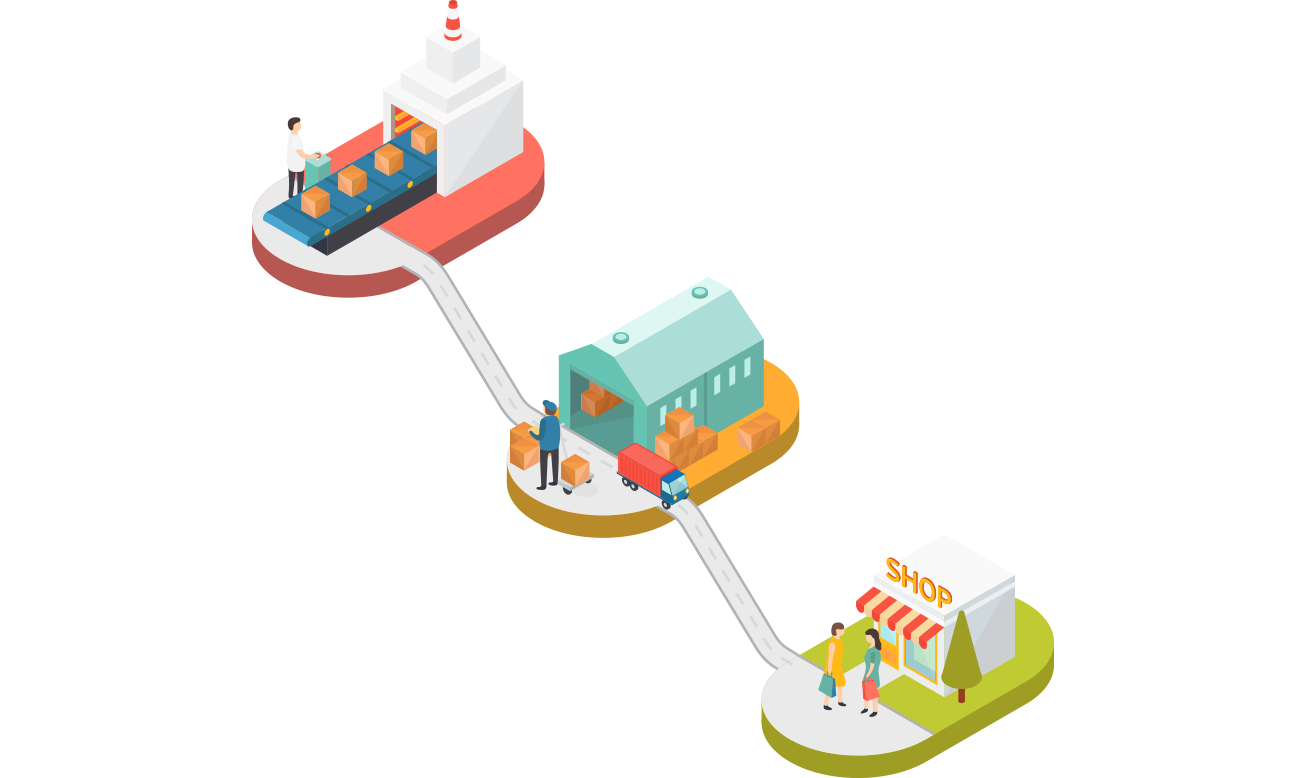October 6, 2025
How to Build Resilience Into Your Supply Chain?
Supply chains face constant threats. Accidents, labor strikes, natural disasters, shifting regulations, or sudden changes in demand can quickly disrupt the flow of goods. When disruptions occur, the effect is not exclusively a delay in deliveries. It can mean missed contracts, lost revenue, strained relationships with clients, and reputational damage. That is why supply chain resilience has become a top priority for businesses across every industry.
For companies that want to remain competitive in unpredictable markets, building resilient supply chains is no longer optional but indispensable. Working with an experienced non-asset-based carrier, a partner that uses an extended network of approved transportation providers rather than operating its own fleet, offers significant advantages in protecting against uncertainty. This model provides the flexibility and expertise necessary to adapt quickly while maintaining controlled costs.
At Last Mile Logistics, our perspective is built on years of helping businesses enhance their operations through non-asset-based solutions. Let us break down what supply chain resilience really means, why it matters, and how companies can benefit from partnering with the right logistics provider.
The Meaning of Supply Chain Resilience
Before strategies, it is essential to clarify the supply chain resilience meaning. At its core, it refers to the ability of a supply chain to anticipate, adapt to, absorb, and recover from unexpected disruptions while maintaining operations.
Resilient organizations do not simply react when things go wrong; they proactively respond to challenges. They plan for multiple scenarios, develop contingencies, and build a culture of adaptability. In practice, resilience may mean rerouting shipments overnight due to a port closure, sourcing from an alternative supplier when a natural disaster halts production, or scaling transportation capacity rapidly during a seasonal surge.
With actual global supply interdependence, climate concerns, and political volatility, the threats are more visible and more complex than ever before. A proactive supply chain resilience initiative can be the difference between thriving and struggling.
The Role of a Non-Asset-Based Carrier
Traditional carriers depend on the assets they own, such as trucks, warehouses, or containers. This model works well in stable conditions but often limits flexibility when problems arise. A non-asset-based carrier operates differently. Instead of being tied to a single fleet or mode, it uses a network of pre-approved transportation and logistics partners.
This structure delivers three distinct advantages:
- 1
Flexibility in capacity – If one provider is unavailable, another within the network can step in to provide coverage.
- 2
Broader reach – Carriers and modes can be matched to fit specific shipments or regions without heavy investment in infrastructure.
- 3
Risk reduction – With more options available, there is less exposure to disruption from a single point of failure.
These benefits directly support improving supply chain resilience because they make it easier to adjust when disruptions occur.
Three Cornerstones of Building Resilient Supply Chains
When organizations partner with experienced non-asset-based carriers, they typically begin by strengthening resilience through three interconnected cornerstones.
Increasing Strategic Stock and Capacity Buffers
While lean supply chains reduce costs, they can leave businesses vulnerable when unexpected events occur. Strategic stock and flexible transportation capacity act as shock absorbers. By analyzing patterns and forecasting demand, carriers can recommend the right balance, avoiding overstocking while ensuring continuity during spikes or delays.
Flexibility Through Technology and Partnerships
Improving supply chain resilience requires real-time visibility and transparency. Advanced platforms now allow businesses to track shipments across multiple modes, geographies, and providers. A non-asset-based carrier integrates these tools with its partner network, offering the transparency and data companies need to make quick, informed decisions.
For example, if severe weather interrupts ground transportation, air or rail alternatives can be identified and arranged immediately. Technology paired with a strong network makes flexibility a daily reality rather than a wish.
A Culture of Risk Awareness and Preparedness
No matter how advanced the systems, people remain at the center of resilience. Successful companies embed a mindset of readiness into their operations. That includes open communication between logistics partners, continuous training, and scenario-based planning.
When disruptions hit, this culture ensures that the response is coordinated, fast, and effective. Managing the supply chain becomes less about scrambling and more about executing a well-rehearsed plan.
Protecting Value Along the Way
One area where we add unique value is loss prevention. Beyond delays, supply chains are vulnerable to theft, fraud, and cargo damage. Every year, billions of dollars are lost due to these issues, which not only impact profits but also diminish client trust.
At Last Mile Logistics, we work closely with our approved partners to enforce strict security protocols. These include:
- Carrier vetting to ensure only trusted providers handle shipments.
- Secure routing strategies to minimize exposure to theft-prone areas.
- Real-time monitoring that allows quick intervention if shipments deviate from expected paths.
- Training and audits that keep partners aligned with best practices.
By emphasizing prevention, businesses gain peace of mind knowing that their goods will arrive safely, even in unpredictable conditions.
The Importance of Risk Management in Supply Chain Operations
Effective resilience cannot exist without substantial risk in supply chain management practices. Companies should view risk management not as a one-time project but as an ongoing process. This involves:
- Identifying vulnerabilities across suppliers, carriers, and distribution centers.
- Evaluating the impact of different types of disruptions, from natural disasters to cyber threats.
- Developing mitigation strategies, such as alternative routing, backup suppliers, or technology safeguards, to address potential risks and vulnerabilities.
- Regularly reviewing and updating plans as new risks emerge.
A mature supply chain resilience initiative integrates these risk management steps into daily operations, ensuring businesses are always prepared.
How Non-Asset-Based Carriers Help Improve Supply Chains
When evaluating ways to improve supply chain performance, companies often focus on reducing costs or increasing speed. While those factors remain essential, resilience is now equally vital. We contribute to all three:
- 1
Cost-efficiency – Access to multiple providers allows competitive pricing without sacrificing reliability.
- 2
Agility – The ability to pivot between modes or partners supports improving supply chain adaptability.
- 3
Risk reduction – A broad, trusted network lowers the chance of disruptions derailing operations.
For the B2B sector, especially, where shipments often involve high-value goods or critical timelines, these advantages ensure that customer expectations are met consistently.
A Smarter Approach to Managing the Supply Chain
The future of logistics will likely bring more complexity rather than less. Climate events, geopolitical shifts, and shifting consumer demand all suggest that disruptions will continue. Companies that view resilience as a core strategy, not just an emergency response, will position themselves to thrive.
At Last Mile Logistics, our experience can help businesses navigate disruptions and leverage them as opportunities to strengthen relationships and demonstrate their reliability. By investing in technology, cultivating strong partnerships, and committing to continuous improvement, organizations create supply chains that are not fragile but adaptive.
Supply chain resilience is about more than bouncing back after a disruption. It is about anticipating challenges, preparing responses, and maintaining continuity when conditions are uncertain. For businesses that want to remain strong in unpredictable markets, building resilient supply chains through experienced non-asset-based carriers offers a proven path forward.
Our expertise lies in delivering flexible, secure, and reliable transportation solutions tailored to the B2B sector. With our focus on loss prevention and a trusted partner network, we help companies achieve the balance of efficiency, adaptability, and protection that defines a truly resilient supply chain. Call Arnie today! He is ready when you are!



